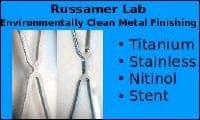
Curated with aloha by
Ted Mooney, P.E. RET

The authoritative public forum
for Metal Finishing 1989-2025

-----
Electrodeposition of zinc on titanium
Q. I need advice on how to improve my process for electroplating titanium with zinc.
I basically just want to show proof of concept by obtaining a uniform layer of zinc with good adhesion on the titanium. Presently, my electroplating takes place in a large beaker [beakers on
eBay
or
Amazon [affil links] with titanium mesh(anode) encircling a titanium disk(cathode) in the center. The anode and cathode are submerged in a electrolyte solution of either ZnCl2 or ZnSO4. So the Zn will come from the solution, not the anode.
Some layer of deposition occurs, depending on the voltage I set it to. But the adhesion is poor and the Zn layer isn't uniform.
I'm aware surface treament for the titanium is important due to the heavy oxide layer that forms. I was thinking of grinding the surface, cleaning with IPA or acetone
⇦ this on
eBay
or
Amazon
[affil links] Warning! highly Flammable!
, then doing an acid dip in nitric acid before finally rinsing and electroplating.
Any advice or tips would be awesome!
- Warsaw, Indiana, USA
August 29, 2012
A. Hi Zach. Plating onto titanium with good adhesion is devilishly difficult. Some people feel the only way it can be done is to first nickel plate the titanium and bake it until the two diffuse together, and use that as a base for further plating. Simple stuff like grinding, wiping with IPA, etc. are unlikely to work. Please try to get access to the Metals Handbook, vol.5., "Surface Engineering", which has a chapter on preparing titanium for plating. Good luck.
Regards,

Ted Mooney, P.E.
Striving to live Aloha
finishing.com - Pine Beach, New Jersey
August 29, 2012
A. Plating on titanium requires special surface preparation and nickel plating techniques. You can consult us for more information

Anna Berkovich
Russamer Lab
Pittsburgh, Pennsylvania

September 6, 2012
Q. So I have decided on a potential surface treatment to remove and help slow the reformation of the oxide layer:
1) Hydrochloric acid dip
2) Nitric acid/hydrofluoric acid activation step
3) Now an electrolytic processing step involving an acetic-hydrofluoric acid anodic process (I'm not so sure about this step)
4) Then I would prefer to apply a nickel strike layer, but since I work in the biomedical field, I'm concerned about the biocompatibility so I really can't involve nickel in the process. So I would skip that step and go directly to electrodepositing zinc.
Thoughts?
- Warsaw, Indiana, USA
September 20, 2012
A. Hi Zac
The problem with plating on titanium is challenging and I wish you luck. However, I think it extremely unlikely that you will achieve an acceptable deposit from a zinc sulphate or chloride bath without using proprietary additives. Talk to the supply houses.
Forgive my curiosity but I can't help wondering why anyone would want to plate zinc onto titanium, particularly for a biomedical application.
If you need a zinc surface could you consider making the parts of solid zinc or zinc alloy?

Geoff Smith
Hampshire, England
September 28, 2012
Q. Geoff,
The particular Ti alloy I'm trying to plate zinc onto is TiAlV. It's a commonly used alloy in the medical field due to it's high biocompatibility and desirable mechanical properties, i.e. high specific strength, low modulus of elasticity, and high fatigue resistance.
The main issue I can see with zinc as a bulk material, is as soon as you begin alloying it with other materials to achieve the desirable mechanical properties, you can run into biocompatibility issues. Don't quote me on this though.
Anyways, back to electroplating zinc onto TiAlV. The potential orthopedic application is it has been shown that Zn compounds can be used to accelerate bone regeneration by stimulating insulin signaling at a fracture site. My goal right now is to bring TiAlV and zinc together via electroplating. The idea is after implantation, the zinc will degrade from the Ti surface and promote faster healing at the surgical site. So basically, the adhesion between the zinc layer and Ti substrate only has to be strong enough to prevent the Zinc from coming off before being implanted.
- Warsaw, Indiana, USA
October 2, 2012
A. That is an interesting application. Could you give some references? But why do you insist on electroplating? It should be pretty easy to coat zinc by PVD processes, e.g.: thermal evaporation, sputtering etc. I suppose cost is not a major consideration in this case.
H.R. Prabhakara - ConsultantBangalore Plasmatek - Bangalore Karnataka India
First of two simultaneous responses -- October 3, 2012
A. Hi Zach
Thanks for clarifying the problem.
You may not be aware that electroplated zinc will inevitably contain some co-deposited organic and metallic inclusions, possibly cadmium, which could make it difficult to get approval for implants and to specify and control the process.
I suggest that you look at PVD (vacuum evaporation) coating as zinc is very easy to evaporate and the deposit will be as pure as the zinc used (but check the Cd content).
If someone has an SEM in your lab, a simple evaporation chamber is frequently used to coat specimens with gold so getting a quick trial with zinc could be simple.
You may be aware of the paper at
ukpmc.ac.uk/abstract/MED/21617843/reload=0;jsessionid=l0CM3coMa7SXM7A5piWQ.2
and the links from it so Zn alloys may still be worth looking at.
Good luck
Geoff

Geoff Smith
Hampshire, England
Q, A, or Comment on THIS thread -or- Start a NEW Thread